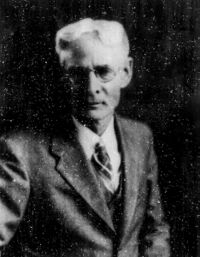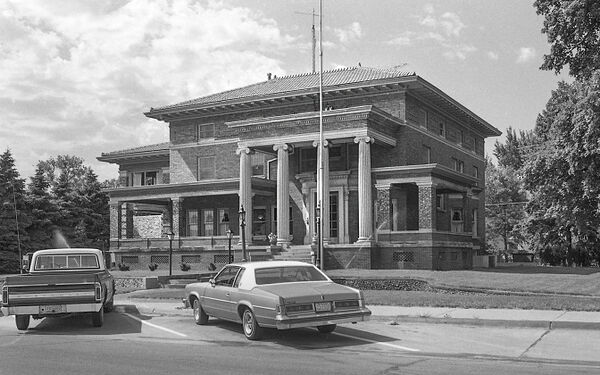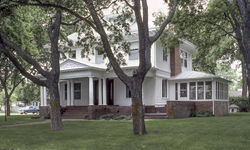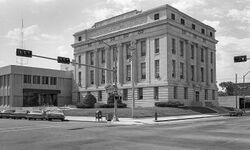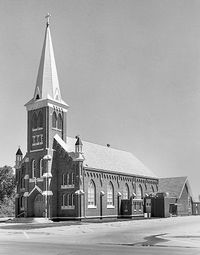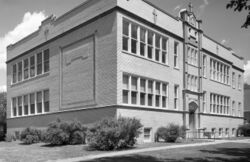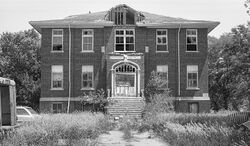Difference between revisions of "Charles Wurdeman (1871-1961), Architect"
m (→References) |
m (→Buildings & Projects) |
||
| Line 53: | Line 53: | ||
==Buildings & Projects== | ==Buildings & Projects== | ||
| + | |||
| + | '''Dated''' | ||
St. Mary’s Hospital (1902-1903), Columbus, Nebraska.[[#References|[9]]][[#Notes|[b]]] | St. Mary’s Hospital (1902-1903), Columbus, Nebraska.[[#References|[9]]][[#Notes|[b]]] | ||
| Line 129: | Line 131: | ||
Remodel Methodist Episcopal Church (1938), Central City, Nebraska.[[#References|[9]]] | Remodel Methodist Episcopal Church (1938), Central City, Nebraska.[[#References|[9]]] | ||
| + | |||
| + | |||
| + | '''Undated''' | ||
| + | |||
| + | Commercial Building (n.d.), 2307 13th St., Columbus, Nebraska.[[#References|[666]]] | ||
==Notes== | ==Notes== | ||
Revision as of 13:28, 7 December 2016
Charles Wurdeman was born in Sherman Township, Platte County, Nebraska, on January 28, 1871. He was chosen at an early age, by the teacher of a rural school, to lead one of three groups of pupils to their homes when the famous blizzard of 1888 struck on January 12th. He became an architect “more or less by accident,” having left the family farm to do carpentry work in Columbus. He became interested in architecture in 1893 at the Chicago World’s Fair, where he observed an architectural exhibit by the University of Illinois; in 1893, the Illinois course was the only one of its kind, a two year course with no degree. He enrolled and finished the course in 1896; his diploma was a listing as a member of the Architects’ Club in the university’s 1896 year book.[8]
Upon returning to Nebraska, Wurdeman became a builder and architect in Platte County, beginning in 1893, and in Columbus, from 1896. His first big job was a 1902 major addition to St. Mary’s Hospital in Columbus. He did not draw plans, but was superintendent of construction. He is also known for designing a reinforced concrete work using crushed flint rock mixed with cement.[8]
Wurdeman survived the depression by drawing plans, as well as doing carpentry and other work. In the 1940s he went into the architectural and engineering business with his son, Henry, as Wurdeman & Wurdeman. In 1956 he was noted as one of the oldest professional men in Nebraska, having worked for sixty years as an architect.[8] He passed away on July 1, 1961.[7]
This page is a contribution to the publication, Place Makers of Nebraska: The Architects. See the format and contents page for more information on the compilation and page organization.
Contents
Compiled Nebraska Directory Listings
Fairbury, Nebraska, 1907
Columbus, Nebraska, 1907. 1909, 1938-1939, 1940-1948, 1950-1959, 1960
Educational & Professional Associations
1893-1896: Special Architecture Course, University of Illinois, Champaign, Illinois.[9]
1896-1907: carpenter and superintendent, Columbus, Nebraska.
1907: architect and owner, Charles Wurdeman, Architect, Fairbury, Nebraska.
1907-1911: architect and owner, Charles Wurdeman, Architect, Columbus, Nebraska.
1911-1913: architect and partner, Wurdeman & Grabe, Architects, Columbus, Nebraska.
1914: retired from architectural practice.[4]
1913-1949: architect and owner, Charles Wurdeman, Architect, Columbus.
1929-1933: superintendent of construction, L.W. Weaver, Civil Engineer, Lincoln, Nebraska.[9]
1933: Established 150 Bench Marks in Columbus, Nebraska.[9]
1937-1938: County Highway Superintendent, Platte County, Nebraska.[9]
1938: Registered Professional Architect, Nebraska, A-81, September 28, 1938.[9]
1945-1949: architect and partner, Wurdeman & Wurdeman, Architects, Columbus, Nebraska.[7]
1949-1960: architect and owner, Charles Wurdeman, Architect, Columbus, Nebraska.[9][g]
Buildings & Projects
Dated
St. Mary’s Hospital (1902-1903), Columbus, Nebraska.[9][b]
St. Francis School (1905-1908), Humphrey, Nebraska.[9][b][e]
Central National Bank (1905-1906), Columbus, Nebraska.[9][b]
Y.M.C.A. Building (1907-1908), Columbus, Nebraska.[8][9][11:63][c]
Superintendent of construction, Sacred Heart Church (1907-1908), Cornlea, Platte County, Nebraska.[11:525]
Dr. C. D. Evans House (1908-1911), 2204 14th, Columbus, Nebraska.[6][8] (PT01-134) National Register narrative
Annex to St. Bonaventure’s Church (1908-1909), Columbus, Nebraska.[9][c]
West Addition (fronting south) to St. Francis Academy (1909-1910), Columbus, Nebraska.[9][11:269][c]
St. Bonaventure Catholic Church III, front addition and steeple (1909-1910), Columbus, Nebraska.[11:235-236][d] (PT01-166)
First National Bank (1909-1910), Cedar Rapids, Nebraska.[9][c]
Meridian Hotel annex (1910), Columbus, Nebraska.[9]
Thurston Hotel annex (1910-1911), Columbus, Nebraska.[9][c]
L. Frederick Gottschalk house (1911), 2022 17th, Columbus, Nebraska. [6] (PT01-177) National Register narrative
Becher, Hockenberger, & Chambers Office Building (1911), Columbus, Nebraska.[9]
St. Francis Hospital (1911-1913), Grand Island, Nebraska.[9]
Public School (1912), Duncan, Nebraska.[9]
Third Ward School (1912-1913), Columbus, Nebraska.[9]
Columbus Carnegie Library (1913-1915), Columbus, Nebraska.[3][9]
Public School (1913), Marquette, Nebraska.[9]
Public School (1913-1914), Cedar Rapids, Nebraska.[9] PIC
Roth and Kula Building (1914), Silver Creek, Nebraska.[9]
Newman Grove State Bank (1914), Newman Grove, Nebraska.[9]
St Stanislaus Catholic School and Convent (1914-1915), Duncan, Nebraska.[9][11:419]
Lincoln Highway Garage Association Building (1915-1916), Columbus, Nebraska.[9]
St. Anthony of Padua (Polish) Catholic Church (1916-1917), Columbus, Nebraska.[9][11:295-297
Platte County Court House (1916-1922), 2606 14th, Columbus, Nebraska.[5][6][8][9] (PT01-001) National Register narrative
Dloughy Motor Company Garage (1917), Schuyler, Nebraska.[9]
Public School District 83 (1917-1918), Madison, Nebraska.[9]
Two Grade Schools (1919-1920), Columbus, Nebraska.[9][10][a]
St. Mary of Assumption School (1920-1921), nwc 4th & Pine St., Dwight.[6][9] (BU06-001.02) National Register narrative
East Addition to St. Mary’s Hospital (1920, 1923-1924), 15th St, Columbus, Nebraska.[9][11:280-281]
St. Bernard’s Catholic School and Convent (1923), Rural Platte County, Nebraska.[11:372] (PT00-046)
Memorial Lourdes Grotto (1919, 1926-1927), St. Michael’s Catholic Complex, ws 3rd at Pine St., Tarnov.[6][11:407][f] (PT12-004) National Register narrative
Remodel Montgomery Ward Store (1929), Columbus, Nebraska.[9]
Designing and superintending Platte County Bridges (1934-1937) under L. W. Weaver, Lincoln, Nebraska.[9]
Remodel Methodist Episcopal Church (1938), Central City, Nebraska.[9]
Undated
Commercial Building (n.d.), 2307 13th St., Columbus, Nebraska.[666]
Notes
a. Trenton Building Company (Ernest Rokahr), Contractors, Lincoln, Nebraska. [10]
b. Superintendent of construction.[9]
c. architect and superintendent.[9]
d. Wurdeman may have been both architect and superintendent of construction; Hagedorn is not entirely clear on this.[11:235-236] This work encompassed another extension of the nave and the addition of the entrance tower; the original two constructions on the church were to designs made by Br. Adrian (Anthony) Wewer, O. F. M. (1836-1914), Carpenter-Architect.
e. Supervising construction. Hagedorn gives the dates as 1904-1906; the architect was Br. Adrian Wewer.[11:453]
f. Adapting a design of the Kaletta Brothers, St. Louis, Missouri.[11:407]
g. Last registered, 1960.[9]
References
1. Margaret Curry, History of Platte Co., Nebraska (Murray & Gee: Culver City, California, 1950). Nebraska Historic Building Survey file PT01-177.
2. “From the Files: Harold Charles Wurdeman,” The Nebraska Professional (November, 1999): 3.
3. Nebraska State Library Commission, Architects and Buildings Card File.
4. Columbus Telegram (July 24, 1914), 1.
5. Oliver B. Pollak, Nebraska Courthouses: Contention, Compromise, and Community [Images of America Series] (Chicago: Arcadia Publishing, 2002), 92. [725.1.P771n]
6. Listed in the National Register of Historic Places.
7. “Charles Wurdeman, 90, Architect, Dies,” Lincoln Journal Star (July 2, 1961), 4B:4.
8. “One of First,” Omaha World Herald (August 12, 1956), 13G:1.
9. Application for Registration to Practice Professional Engineering and Architecture, Nebraska State Board of Examiners for Professional Engineers and Architects, July 13, 1938. Nebraska State Historical Society RG081 SG2.
10. Contract in Rokahr Family Collection, MS3584, S.2, f.1. Nebraska State Historical Society archives.
11. Eugene Hagedorn, O. F. M. The Franciscans in Nebraska. Humphrey, Nebraska: Humphrey Democrat and Norfolk Daily News, 1931.
12. Photo by David Murphy. “Commercial Building.” Columbus, Nebraska. PT01-120
Page Citation
D. Murphy, “Charles Wurdeman (1871-1961), Architect,” in David Murphy, Edward F. Zimmer, and Lynn Meyer, comps. Place Makers of Nebraska: The Architects. Lincoln: Nebraska State Historical Society, April 9, 2015. http://www.e-nebraskahistory.org/index.php?title=Place_Makers_of_Nebraska:_The_Architects Accessed, October 30, 2024.
Contact the Nebraska State Historic Preservation Office with questions or comments concerning this page, including any problems you may have with broken links (see, however, the Disclaimers link at the bottom of this page). Please provide the URL to this page with your inquiry.
